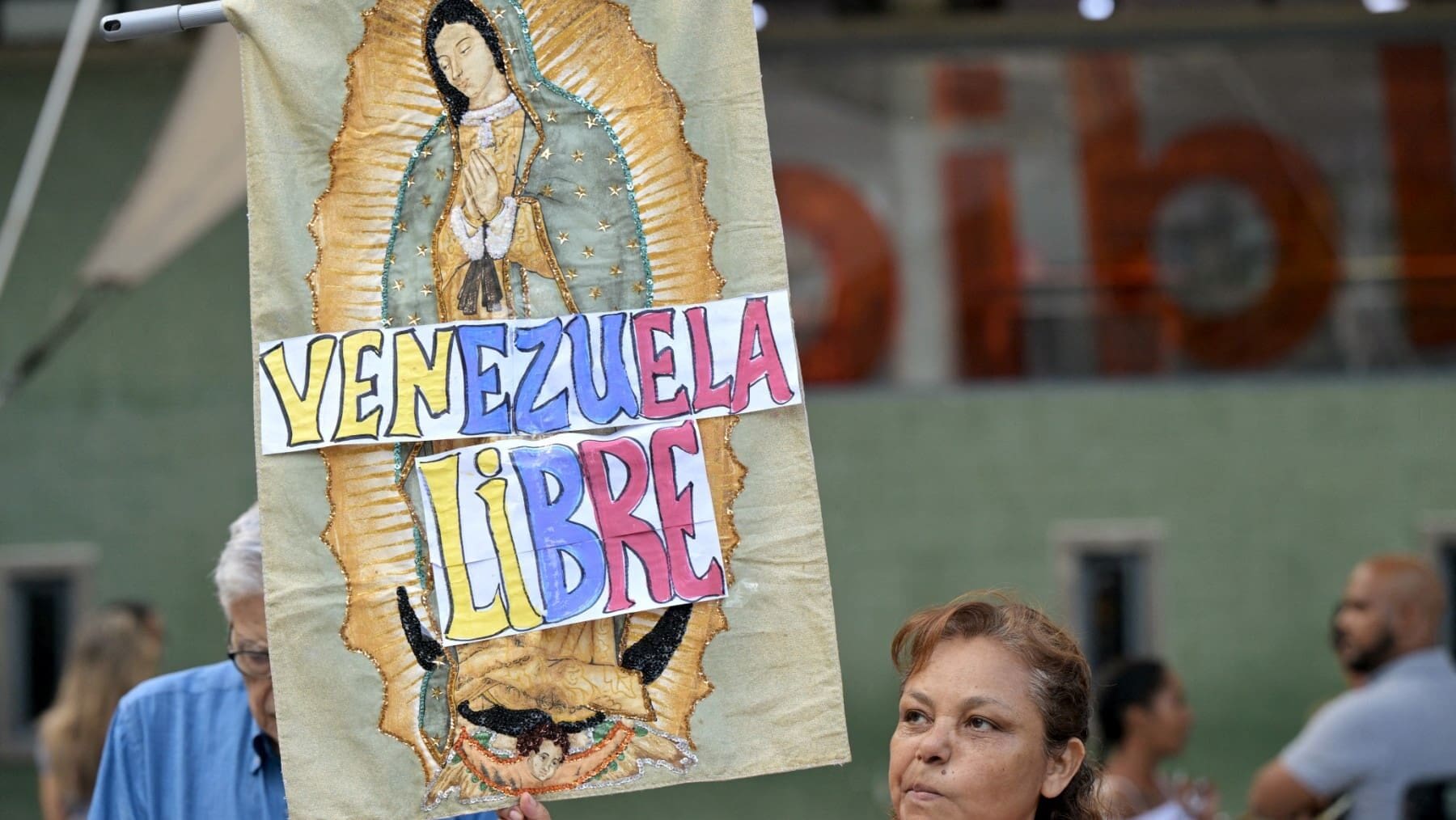
A woman holds an image of Virgin Mary with the words Free Venezuela (Photo by Yuri Cortez / AFP)
Isadora Zubillaga is the former ambassador of the Venezuelan Government to France and former deputy minister for foreign affairs of Venezuela. She has a bachelor’s degree in economics and political science from Boston University and a master’s degree in international relations from the Sorbonne.
When considering Venezuela, it’s difficult to predict exactly how Nicolás Maduro and his regime will end. However, as the opposition leader, María Corina Machado has emphasized, the best scenario for everyone involved—including Maduro and his inner circle—is to pursue a peaceful, orderly, and negotiated transition to democracy. This would minimize suffering and pave the way for a stable and prosperous future for all Venezuelans.
Unfortunately, Maduro appears to be choosing a different path, one marked by lies, repression, and violence. The regime’s response to the widespread demonstrations has been brutal, with more than 20 people killed and the number sadly increasing. Hundreds have been arrested; and, just last night, Maduro himself announced that 2000 people have been detained for protesting.
Yet, despite this repression, the Venezuelan people are not backing down. Their fight is not just about political rights; it’s an existential struggle against a regime so corrupt and predatory that it leaves no room for the Venezuelan people to thrive. The resolve of the Venezuelan people to reclaim their democracy is unyielding, and I believe they will continue to push forward, regardless of the obstacles placed in their path by this dying regime.
Yes, we do believe that is still possible. The men and women in uniform, along with their families, are not immune to the harsh realities of Venezuela’s current situation. They, too, are enduring the incredibly difficult economic conditions, the lack of opportunities, and the collapse of public services. They are acutely aware that enduring another six years under Maduro’s rule is an unbearable prospect.
However, there are significant barriers preventing this alignment of the military and security forces with the aspirations for freedom shared by all Venezuelans. One major factor is the presence of foreign security agents, particularly from Cuba and Russia, who occupy key positions and influence the decision-making processes within the regime. Another factor is the regime’s sophisticated surveillance apparatus, which is operated by intelligence units trained to monitor and suppress any signs of dissent. Lastly, there’s a deeply ingrained culture within the military that constantly reminds personnel of the dire consequences of betraying the revolution. Those who have dared to dissent have faced torture and unspeakably inhumane treatment in detention, even death, serving as a brutal warning to others.
These factors certainly complicate the situation, but we believe that the deepening crisis in Venezuela could still lead to a shift in loyalties, as the desire for change and a better future grows stronger within the ranks.
So far, we have seen three distinct responses from the international community:
• Support and congratulations to Maduro for the election result from Bolivia, Nicaragua, Honduras, Cuba, Iran, Russia, and China;
• Criticism and non-recognition of the election result from Uruguay, Argentina, Costa Rica, Ecuador, Guatemala, Panama, Paraguay, Peru, the Dominican Republic, Chile, El Salvador, the United States, Spain, Germany, the United Kingdom, and the rest of the European Union;
• And a neutral stance and calls for transparency from Brazil, Colombia, and to a lesser extent, Mexico.
We believe that governments which are in some way close to the regime, such as those of Brazil and Colombia, have a critical role to play. They could be pivotal in convincing Maduro of the impracticality and unsustainability of his plan to steal the election and maintain power as a de facto government.
Additionally, it’s heartening to see that, for many Latin American governments (such as Chile), democratic principles and the protection of human rights transcend ideological divides. This adherence to democratic values is commendable, and I congratulate those leaders who are standing firm in their commitment to democracy. I also encourage them to continue their efforts in helping Venezuela restore its democratic order.
When María Corina Machado speaks of an orderly transition, this concept is very much included. There have been clear signals from the Opposition and various international partners expressing a willingness to provide such a ‘golden bridge’ for Nicolás Maduro and his inner circle.
It’s a difficult proposition to consider, especially given the atrocious human rights violations and international crimes committed by the regime. Any proposal of this nature would need to be crafted with the support of the Venezuelan people, who have suffered under this regime for so long.
Despite the offers made, Maduro and his allies seem to be opting for a path of violence and repression. However, we still believe there is time for Maduro and his circle to accept these offers—a negotiated peaceful transition with guarantees, designed to reduce their exit costs and provide a way out. Venezuelans are eager to move forward and rebuild their country.
